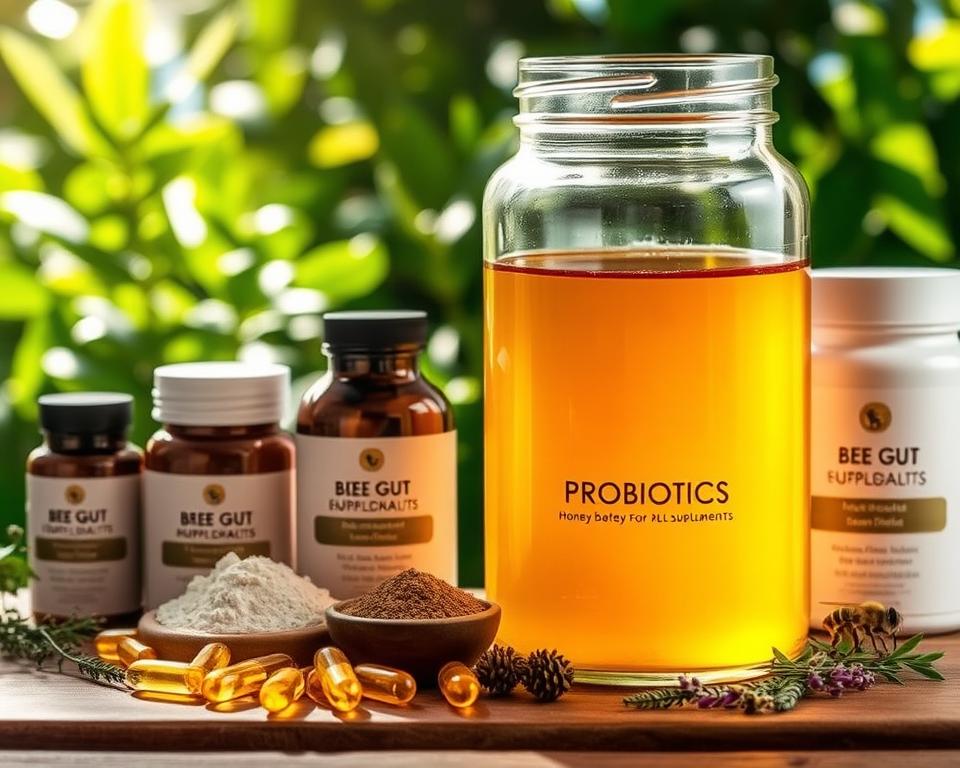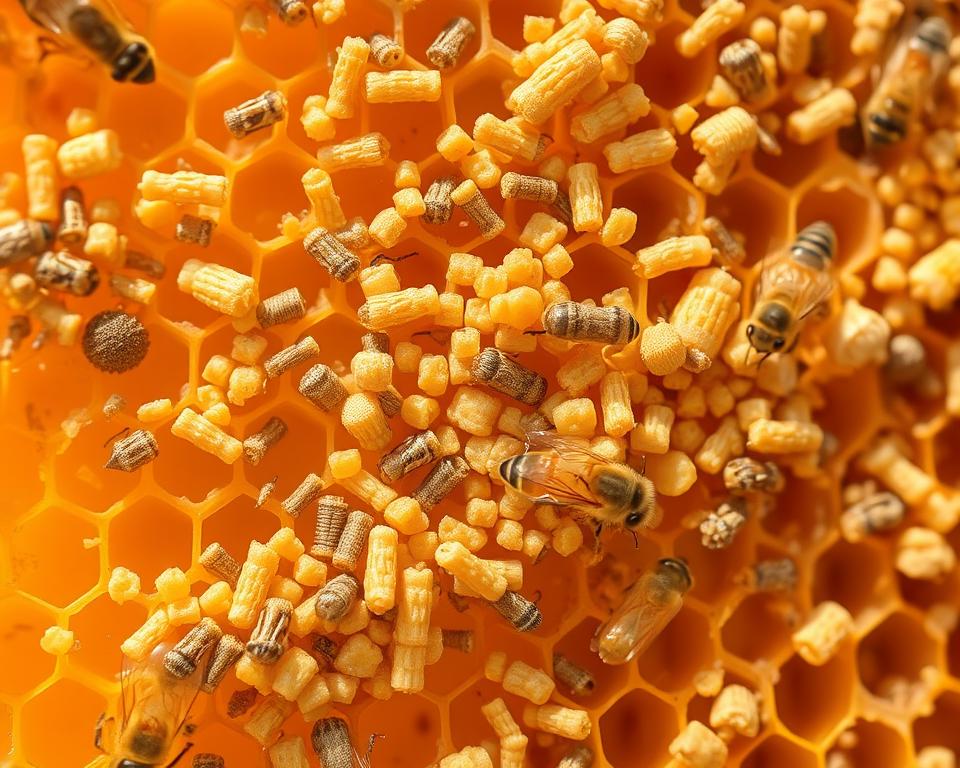As a beekeeper, I’m deeply concerned about the health of my honey bees. With one-third of the food we consume relying on bee pollination, their well-being is key. Bees face many challenges, like diseases and pesticides, which can harm colonies. Recently, probiotic supplements have caught my eye for their promise to boost bee health.
By improving the gut health of honey bees, probiotics can enhance their immune system and vitality. As someone dedicated to beekeeping, learning how to use probiotics effectively is vital.
Key Takeaways
- Probiotics can improve honey bee health by boosting their gut health.
- Using probiotic supplements can strengthen the immune system of bees.
- Probiotics can lead to healthier, more vibrant bee colonies.
Introduction to Probiotics for Honey Bees
Honey bee health is closely tied to their gut microbiome. Probiotics are key in this balance. The gut of honey bees hosts a complex mix of microorganisms. These are vital for their health and energy.
Probiotics are live microorganisms that offer health benefits. For honey bees, these beneficial bacteria help keep their gut healthy. This is essential for their immune system and overall well-being.
What Are Probiotics?
Probiotics are beneficial bacteria similar to those in honey bees’ guts. They come in powders and liquids. Beekeepers can add them to the bees’ food or water. This supports the health of their colonies.
Importance of Probiotics for Honey Bees
The role of probiotics in honey bees’ health is huge. They help keep the gut bacteria balanced. This boosts the bees’ immune system and overall health.
This is key when facing environmental stressors and diseases. These threats can harm bee colonies.
| Benefits of Probiotics | Description |
|---|---|
| Enhanced Immune System | Probiotics help maintain a healthy gut microbiome, supporting the immune system of honey bees. |
| Improved Nutrient Absorption | Beneficial bacteria aid in the digestion and absorption of nutrients, promoting overall health. |
| Increased Hive Vitality | By supporting the health of individual bees, probiotics contribute to the vitality of the entire hive. |
As beekeepers, using bee gut health supplements is a smart move. It helps keep our honey bees healthy and strong. By understanding probiotics and beneficial bacteria, we can better care for our bee colonies.
Understanding Honey Bee Digestive Health
Honey bee digestive health is key to their well-being. It affects their nutrition, immune system, and the colony’s strength. Their digestive system has many microorganisms that are vital for their health.
The Bee Gut Microbiome
The bee gut microbiome is made up of different bacteria. These bacteria are important for the bees’ nutrition and immune system. Beneficial bacteria help break down food, absorb nutrients, and make vitamins.
Key components of a healthy bee gut microbiome include:
- Snodgrassella alvi: A bacterium that plays a significant role in the bees’ metabolic processes.
- Gilliamella apicola: Involved in the breakdown of complex sugars and nutrient absorption.
- Lactobacillus spp.: Contributes to the bees’ immune system and overall gut health.
How Probiotics Support Gut Health
Probiotics help the gut health of honey bees by adding good bacteria. This improves nutrient absorption, boosts the immune system, and enhances colony health.
| Probiotic Benefits | Description | Impact on Bee Health |
|---|---|---|
| Enhanced Nutrient Absorption | Probiotics help in breaking down complex foods, making nutrients more accessible. | Improved overall health and vitality |
| Immune System Support | Beneficial bacteria support the bees’ immune system, helping them fight off diseases. | Reduced susceptibility to diseases |
| Colony Vitality | A healthy gut microbiome contributes to the overall vitality of the colony. | Increased hive productivity |
By understanding and supporting the digestive health of honey bees through probiotics, beekeepers can play a vital role. They help keep colonies healthy and promote bee vitality.
Types of Probiotics for Honey Bees
Honey bees can greatly benefit from certain probiotic strains. These live microorganisms offer many advantages when given in the right amounts. For bees, they are key to a healthy gut, which is vital for their health.
Bacterial Strains Beneficial to Bees
Several bacterial strains are good for honey bees. Lactobacillus and Bifidobacterium are often used in bee probiotics. Research on PMC shows they help with nutrient absorption and boost the immune system.
- Lactobacillus: This genus helps with digestion and boosts the immune system.
- Bifidobacterium: This genus is important for a balanced gut and overall bee health.
Commercially Available Probiotic Products
Choosing a probiotic for bees requires looking at reputable brands. Some products are made just for bees, with strains that meet their needs. Beekeepers should pick products with scientific backing and good reviews.
When picking a probiotic, consider these factors:
- The specific strains and their benefits for bees.
- The product’s viability and shelf life to ensure effectiveness.
- Clear instructions for use to help beekeepers apply it correctly.
By picking the right probiotic, beekeepers can greatly help their bees. This support is key to their success in beekeeping.
Benefits of Probiotic Use in Beekeeping
Beekeepers are now using probiotics as a natural solution for bee immunity. Probiotics help the gut health of honey bees. This boosts their immune system and improves their health.
Enhanced Nutrient Absorption
Probiotics help honey bees absorb nutrients better. This is key for keeping their energy up and health good. A healthy gut microbiome lets bees get the nutrients they need.
Improved Immune Response
A strong immune system is key for honey bees to fight off diseases and pests. Probiotics help modulate the immune response. This makes bees more resilient and reduces colony losses.
Increased Hive Vitality
The health of a hive depends on its bees. Probiotics promote a balanced gut microbiome. This makes the hive more vigorous and productive, leading to better honey production and a stronger colony.
In conclusion, probiotics offer many benefits in beekeeping. They improve nutrient absorption and increase hive vitality. As beekeepers look for natural ways to support bee health, probiotics are proving to be a valuable tool.
Probiotics and Bee Disease Resistance
Probiotics help honey bees stay healthy by supporting their gut microbiome. A balanced gut is key for their immune system. It helps them fight off diseases and pathogens.
Common Bee Diseases Affected by Probiotics
Honey bees face many diseases, but probiotics can help. Some common ones include:
- American Foulbrood: A bacterial disease that can decimate bee colonies.
- Nosema: A fungal disease that affects the bees’ digestive system.
- Varroosis: Caused by the Varroa mite, this condition can lead to a weakened immune system in bees.
Probiotics can boost bees’ natural defenses. This helps reduce disease incidence.
Case Studies on Probiotics and Disease Prevention
Studies show probiotics are effective against bee diseases. For example, some probiotic strains can lower Nosema spores in bees. This improves their health.
- A study in the Journal of Apicultural Research found probiotics reduced Nosema infection in bees.
- Another study showed probiotics strengthen bees’ immune response. This makes them more resistant to diseases.
These results highlight probiotics’ role in beekeeping. They help keep bee colonies healthy.
Application of Probiotics in Beekeeping
Beekeepers are exploring new ways to help their bees, and probiotics are a promising option. These bee gut health supplements improve digestion and boost the health of honey bees.
It’s key to know how to use probiotics right. This means choosing the best way to give them to the bees and making sure it’s safe and works well.
Proper Administration Techniques
When giving probiotics to bees, how you do it matters a lot. You can mix the probiotics with sugar or water to make a tasty feed. It’s also important to spread the probiotics evenly in the hive so all bees get some.
Feeding methods can differ. Some beekeepers feed the bees directly, while others use special devices to cut down on waste and make sure the probiotics are used well.

Timing and Dosage Recommendations
When and how much probiotics to give is very important. They are usually given during stressful times or when bees are most open to them, like in the spring when they’re growing.
How much to give depends on the probiotic and the size of the bee colony. Always follow the maker’s advice and talk to other beekeepers to find the right amount for your hive.
By thinking about how to give probiotics and when, beekeepers can really help their bees. This leads to healthier and stronger bee colonies.
Challenges in Using Probiotics for Honey Bees
Probiotics have shown promise in helping honey bees. But, using them comes with challenges. Beekeepers are turning to probiotics to boost their colonies’ health. It’s key to know the risks and limits.
Potential Risks and Limitations
One big worry is how probiotics might affect the bee gut microbiome. Adding new bacteria can upset the balance, harming bee health.
The success of probiotics depends on many things. This includes the type of bacteria, how it’s given, and the bees’ health. Also, rules on using probiotics in beekeeping are changing and vary by place.
Key Considerations:
- Strain specificity and efficacy
- Method of administration
- Colony health status
- Regulatory compliance
Addressing Misconceptions
There are myths about probiotics for bees. Some think they fix all bee health problems. But, probiotics are just one tool to help, not a cure-all.
To show the challenges, let’s look at different probiotic products for bees:
| Product | Strains Used | Efficacy Rating | Regulatory Status |
|---|---|---|---|
| Probiotic A | Lactobacillus, Bifidobacterium | High | Approved |
| Probiotic B | Bacillus subtilis | Moderate | Pending |
| Probiotic C | Multiple strains | Variable | Approved |
Knowing these challenges helps beekeepers use probiotics wisely. This supports the health and strength of their honey bees.
The Future of Probiotics in Beekeeping
The use of probiotics in beekeeping is growing fast. New studies and ideas keep coming up. As we learn more about bees and their microbes, we see how probiotics can help.
Research Trends and Innovations
Studies show that beneficial bacteria for bees can make them healthier. Scientists are working to find the best probiotics and how to use them. For example, a study on the National Center for Biotechnology Information website shows how probiotics can help bees.
Some important trends in probiotic research for beekeeping are:
- Finding the best probiotic strains for honey bees
- Creating probiotic products for specific bee health needs
- Studying how probiotics prevent diseases and boost immunity
Landscaping for Bee-Friendly Environments
It’s key to make environments friendly for bees. This means planting many different plants and supporting bee microbiome support. This helps bees get the nutrients they need to stay healthy.
Some ways to make your area bee-friendly include:
- Planting flowers that are full of nectar and pollen
- Not using pesticides or harmful chemicals
- Creating safe spaces for bees in your apiary and around it

Using probiotics and making your area bee-friendly can help a lot. This approach can make honey bee colonies stronger and more productive.
Selecting the Right Probiotics for Your Hive
Choosing the right probiotics for your hive is key to your bees’ health and productivity. With many products out there, knowing what to look for is important.
Factors to Consider
When picking a probiotic, several things matter. The type of bacteria used is vital, as different strains help in different ways. For example, Lactobacillus and Bifidobacterium strains are good for bee gut health.
The potency of the product is also key. A product with more CFU (Colony-Forming Units) might work better. But, it’s important to store and use it right to keep its strength.
- The manufacturer’s reputation and product reviews
- The presence of additional ingredients that may support bee health
- The product’s compatibility with other beekeeping practices
Reputable Brands and Products
Many trusted brands offer top-notch probiotic supplements for apiaries. Look for products that have been tested and shown to work well in beekeeping. Some come with advice on how and when to use them, making it easier to fit them into your routine.
Talking to other beekeepers and hearing about their experiences with probiotics is also smart. It can give you useful tips and help you choose the best product.
By carefully looking at these points and picking a well-known product, beekeepers can boost their bees’ health and energy. Whether you’re new to beekeeping or have been doing it for years, the right probiotic can be a great tool for your apiary.
Conclusion: Embracing Probiotics for Bee Health
Probiotics are a natural way to help honey bees stay healthy. Beekeepers can use them to boost bee immunity. This knowledge helps them make better choices for their bees.
Probiotics can make hives stronger and less prone to disease. Beekeepers using these natural methods help keep bees healthy. This is good for the whole bee population.
Vital Steps for Bee Care
To get the most from probiotics, beekeepers need to use them correctly. They should know when and how much to give. Choosing trusted probiotic products is also key.
By using probiotics and other natural methods, beekeepers help their bees thrive. This helps the whole hive stay healthy and strong.
